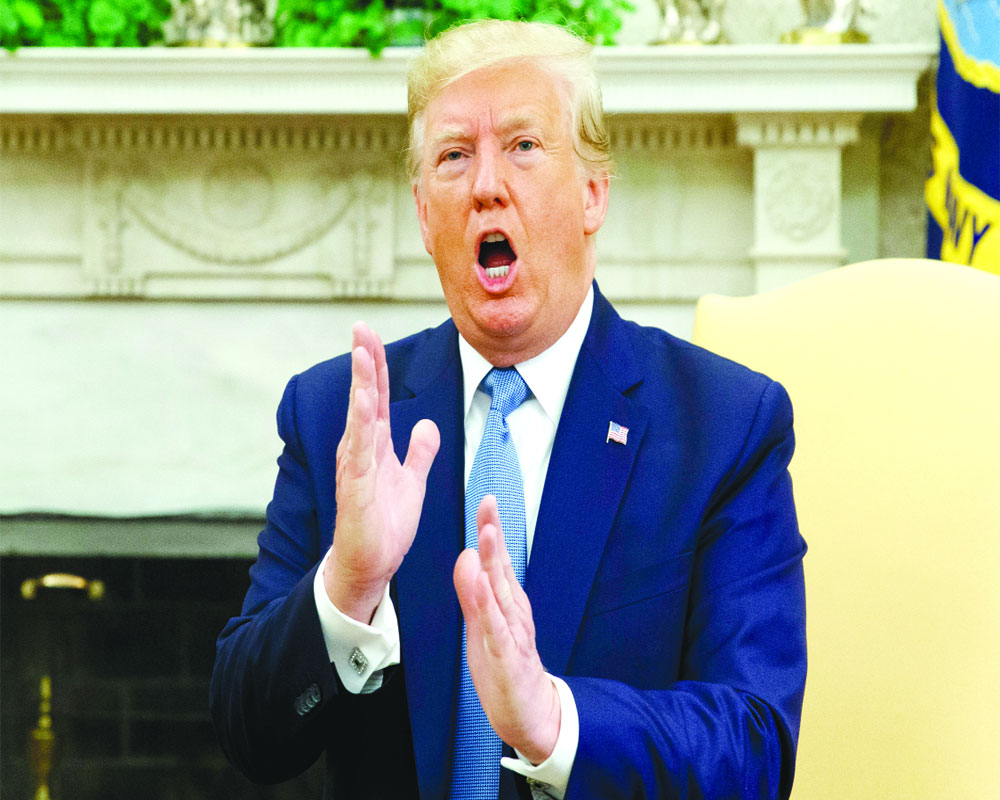By proposing mediation in Kashmir, the US President has clearly gone a bit too far this time
Going over the US President Donald Trump’s latest missive against India that he wouldn’t mind mediating or arbitrating the Kashmir issue, one cannot help but be reminded of author Lewis Caroll’s famous observation. “Who in the world am I? Ah, that’s the great puzzle,” his protagonist asks this question of herself in Alice in Wonderland, just after she had grown to a giant size and frightened the White Rabbit away. Yes, Trump has been upending prevalent diplomatic norms across the world and assigning himself the role of a global peace-maker but in the process now runs the real danger of upsetting allies and emergent powers and ignoring the layered complexities of Southeast Asia. And India, now, quite frankly is being too easily tossed about as a thorn in the flesh despite its strategic value to US interests. So India was literally taken aback by Trump’s claim that he had had a talk with Prime Minister Narendra Modi on Kashmir, who, the US President implied, was quite amenable to the idea of his intervention. Of course, India was quick to clarify its position that the subject was never a part of the discussion at the G-20 talks where the two leaders met, that it continued to be a bilateral issue and that talks were only possible in the event of a cessation of cross-border terrorism by Pakistan. Understandably the US administration spent much of the day calming anxieties, worried by Trump’s impromptu observation that only served to highlight his ignorance and misplaced proactiveness. Everybody on Capitol Hill was expectedly worried about burning bridges with India considering they know it has rejected mediation by other governments for decades, insisted Kashmir was a bilateral issue and has never ever budged on reversing that stand even by a whisker. Lobbyists are worried that the gains in Indo-US relations made over the years by staying out could come under a cloud considering this time Trump went a bit too far in attributing statements to none other than Prime Minister Modi himself.
It is not too difficult to analyse the context of Trump’s statement. Pakistan Prime Minister Imran Khan met him and, considering the negative perception around our neighbour over terror funding and sponsorship and Trump’s own statement that he had to literally force its hand on arresting Hafiz Saeed, the US President may have felt the need to accommodate him a little. Particularly, since Pakistan has a strategic trumpcard in managing the Taliban and a significant role in the Afghan peace process where the US is invested too. India, so far, is against direct talks with the Taliban. So if this remark was indeed meant to be a pressure tactic, it is definitely nothing but a cheap shot. Also, Khan had not too warm a welcome in the US and Trump may have humoured him. There is no need to mention the brownie points that Pakistan would naturally score from this statement as it has always welcomed an external mediator. But Trump’s offer, coming as it does post-Balakot, with the US claiming to have pulled back both nations from an escalation of hostilities, now seems like favouring Pakistan at India’s expense and a return to the old line. It is said that Trump’s meeting with Khan was reportedly arranged through the Saudi crown prince, Mohammed bin Salman, who also had a hand in quelling sensitivities post-Balakot and neutralised a few trust issues that the US has with Pakistan. Apparently, US media reports said he had used his friendship with Jared Kushner, Trump’s son-in-law, to help arrange the meeting. So desperate is Khan for American investment that he even claimed that Pakistan’s Inter-Services Intelligence (ISI) had led the US to the hideout of Osama bin Laden, reversing years of official denial. Whatever may be the US nativist, protectionist and selfish concerns and our understanding of Trump’s need to serve his constituency, the pressure points cannot be so much as to undo years of progress made in the Bush through Obama years. As it is we are dealing with the US blowback on new defence deals with Russia and sanctions on crude oil from Iran. Trump may feel that his diplomatic unpredictability with North Korea, walking out from the 2015 Paris climate agreement and withdrawing from the deal with Iran may change geopolitics. But when he overcooks it, which he has clearly done with India this time around, the consequences can only affect Indo-US relations.
























